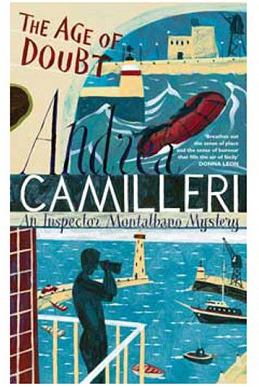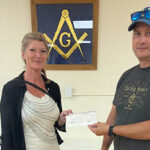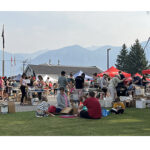Home »

Men and women will enjoy The Age of Doubt
Book Review
By Derryll White
Camillerie, Andrea (2012). The Age of Doubt.
 I cannot think of a more appropriate author to read right now. It is September, and sitting on the paving stone patio at Hot Shots Café with the hot sun beating on my shoulders, I enjoy reading and drinking my coffee even as Inspector Montalbano makes his in Sicily. Beautiful ladies are baring their arms and shoulders and thighs to the golden rays. The perfect book, the perfect spot, great coffee – it just doesn’t get any better or any more decadent.
I cannot think of a more appropriate author to read right now. It is September, and sitting on the paving stone patio at Hot Shots Café with the hot sun beating on my shoulders, I enjoy reading and drinking my coffee even as Inspector Montalbano makes his in Sicily. Beautiful ladies are baring their arms and shoulders and thighs to the golden rays. The perfect book, the perfect spot, great coffee – it just doesn’t get any better or any more decadent.
Camilleri does not shy away from social issues. He takes on the plight of refugees in “The Age of Doubt.’ We simply don’t get it here in North America. I witnessed it in Sweden, a huge tide of humanity fleeing eastern Europe and the former Soviet Bloc countries. They are people, just like us, looking to better the possibilities of their children as most of our own forbearers did. And we let ourselves see them as a threat, learn to hate them because they are “different.”
The author also continues to abuse himself through his main character, Inspector Montalbano. The Inspector continually worries about his sexual prowess as he ages. Can he, can’t he? Younger women are so appealing. And they are – every man knows this. But the Inspector’s problem is that he is not content to just look, not content with his ongoing relationship with his friend, Livia. No, he pushes himself out into the wars, and wallows in the comfort of love for its own sake – am I “in love?” Then I should feel this!
I think some of these feelings are not gender exclusive. Certainly they are fun to contemplate. I also think Montalbano should relax and enjoy the obvious beauty and generous lust of older women – but he doesn’t. I really like Camilleri’s European style and base sensibilities. Men and women both will, I think, laugh at and enjoy ‘The Age of Doubt.’
********
Excerpts from the novel:
REFUGEES – The remains of hundreds and hundreds of men, women, and children who, after a ghastly journey through godforsaken deserts and wastelands that had decimated their numbers, had hoped to come ashore in a country where they might be able to earn a crust of bread.
And for that journey they had given up everything, sold their bodies and souls, to pay in advance the slave traders who trafficked in human bodies and often did not hesitate to let them die, throwing them into the sea at the slightest sign of danger.
DEATH – People often say that death is a liberation. For those who die, naturally. Because for those who go on living it’s almost always a colossal pain in the ass.
MONTALBANO’S VIEW OF THE WORLD – Sicily’s getting to be like a tropical island, the inspector thought, with rain and sunshine continually alternating in a single day. Except that, according to what one saw in ‘Murican films, on tropical islands you could eat, drink and not give a fuck about anything, whereas here you only ate what the doctor allowed you to eat, drank only what your liver allowed you to drink, and every moment of life was a ballbuster. That made quite a difference.
HUMAN CONDITION – It was a beautiful day. The sky looked as if it had received a new coat of paint during the night, and yet the moment he got in his car to go to eat at Enzo’s, a sudden bout of melancholy descended on him with such force that everything – sky, buildings, people – turned grey all at once, as on the darkest of winter days.
LOVE – In matters of love, reason either resigns or sits back and waits. If it’s still present and functioning, and forces you to consider the negative aspects of the relationship, it means it’s not true love.
REFUGEES – It wasn’t the smell of filth. No, it was something completely different. It arose directly from their skin, an ancient yet present strong smell of despair, of resignation, of misfortunes and violence suffered with heads bowed…
Yes, what that heartrending smell communicated was sorrows of the injured world.
 – Derryll White once wrote books but now chooses to read and write about them. When not reading he writes history for the web at www.basininstitute.org.
– Derryll White once wrote books but now chooses to read and write about them. When not reading he writes history for the web at www.basininstitute.org.







